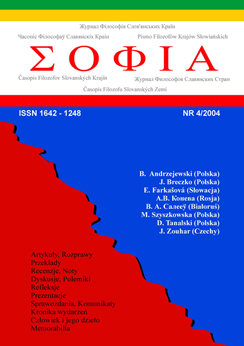THEORIA CUM PRAXI. Przyczynek do charakterystyki filozofii polskiej
THEORIA CUM PRAXI. A Contribution to the Characteristic of Polish Philosophy
Author(s): Bolesław AndrzejewskiSubject(s): Philosophy
Published by: Stowarzyszenie Filozofów Krajów Słowiańskich
Summary/Abstract: The aim of this essay is to give some indication of the practical, sometimes even pragmatic character of Polish thought, ever since its beginnings in the Middle Ages. However, we will endevour to substantiate that Polish philosophy differs from radical practicality, especially from its pragmatic version. Rejecting, as we are going to show, extreme (most frequently, German) rationalism, it did not accept without reservations the postulates of British-American philosophy either. Resting its hierarchy of values on the practical criterion, Polish philosophy did not get lost in an uncritical way in pragmatic relativism and subjectivism. Since the 19th century it exercised, in a conscious and studied way, its own specific character, whose crowning achievement was "Polish humanism", the marking method of which was that of "theoria cum praxi". The argument will be substantiated using the examples of selected and shortly presented personalities and moments of Polish philosophy, from the Middle Ages to the 2th century.
Journal: ΣΟΦΙΑ. Pismo Filozofów Krajów Słowiańskich
- Issue Year: 2004
- Issue No: 4
- Page Range: 45-53
- Page Count: 9
- Language: Polish

